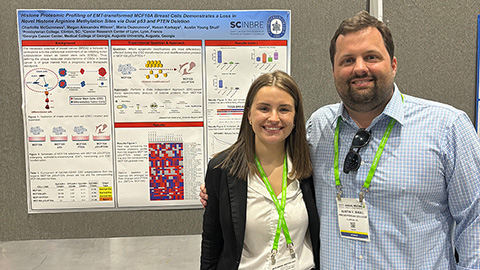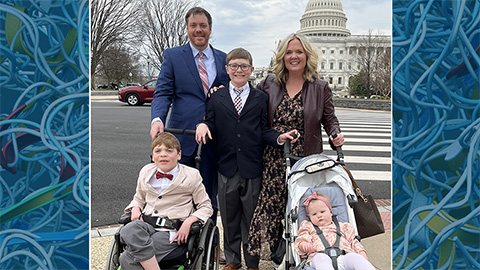Imposter syndrome
and diversity students
In today’s graduate education environment, “diversity students” — as defined in the notice NOT-OD-15-053 from the office of the director at the National Institutes of Health to include underrepresented minorities, students with disabilities and those from a disadvantaged background — must constantly navigate stereotypes and misperceptions. The stereotypes and misperceptions, which challenge the notion that their successes are due to merit alone, make these students particularly susceptible to a certain condition. Imposter syndrome is a condition where one feels inadequate or unworthy of his or her success or accomplishments despite evidence suggesting otherwise.

The term “imposter syndrome” was coined in 1978 by Pauline Rose Clance and Suzanne Imes at Georgia State University in a paper they published in the journal of Psychotherapy Theory, Research and Practice. “Imposter syndrome” quickly moved into the mainstream. We use the term to describe the chronic and potentially lifelong feelings of inadequacy and self-doubt that affect performance and professional outcomes. We believe that the anecdotal experiences highlighted in this article hold true among students across many institutions and fields and result in creating imposter syndrome in diversity graduate students. We hope this article will encourage open dialogue, without which the best intentions of programs designed to build, foster and retain diversity in the STEM disciplines may be undermined.
Perspectives from two URM students
Prior to entering graduate school, our strong work ethic and academic achievements gave us the confidence to believe that we were fully qualified to undertake graduate training at a top research institution. However, throughout our graduate careers, many of our achievements have been attributed to our inclusion in an ethnic group rather than hard work or talent. Recurring encounters began to compromise our perceptions that we were indeed competent and qualified to be successful scientists on our own merits. This was despite progression through our graduate programs with all other outward signs of success. Here are some of our experiences:
By Julia Omotade
Upon entering graduate school, I received a merit-based fellowship that the institution used to attract top applicants. Importantly, this fellowship is not associated with any diversity initiative. When several colleagues became aware of this fellowship, they asked how much “diversity money” I was receiving. Thus, instead of an accomplishment, this fellowship instantly was transformed in my mind into an automatically generated handout based on statistics or an attempt to meet a “diversity quota.”
During my second year, I was selected to receive support from our institutional T32 training grant from the NIH. Despite the fact that this grant is reserved for talented and successful students, I heard comments from colleagues suggesting that I was selected primarily to document institutional diversity. Prior to hearing such comments, I had been humbled and extremely proud of my accomplishments. I had worked hard, been vocal in classes, made good impressions, and progressed well in my training and research. Though my academic record suggested that my merit rather than racial identification was the source for my accomplishments, I internalized the perception that my accomplishments were based on racial identification and began to believe the misperceptions surrounding my success.
Over the past decade, the NIH (and other institutions) has made a robust effort to increase racial and cultural diversity of the research workforce. Although these programs have been fundamental to increasing diversity on a national and institutional basis, my experience is that such awards often are interpreted as affirmative action and viewed as avenues through which unqualified individuals procure opportunities that they could not have secured on merit alone. For example, my deepest and most persistent feelings of imposter syndrome arose from comments regarding my NIH predoctoral diversity fellowship, also commonly referred to as an F31. Although fellowship applications from URM students are reviewed using the same criteria and scoring matrix as nonminority fellowships, it became clear to me that these fellowships are regarded by my colleagues as less competitive. It is common for URM students to hear comments such as “I wish I could apply for the diversity fellowship” or “You’re so lucky you can apply for the diversity F31.” For a URM student, these comments instantly depreciate the competitiveness and value of these awards. I vehemently defended the competitiveness of my fellowship, but I internally began to believe that this award was inferior to the grants awarded to my non-URM colleagues.
By Jamie King
I attended a historically black college, which helped build the strong level of confidence that I had when I entered graduate school. During that time, I did not encounter colleagues who viewed designated diversity initiatives as handouts.
However, early in my graduate career, it became apparent that some people perceived these awards to be handouts. I recall specific comments while taking a highly stressful grant-writing course during which my colleagues and I felt the pressure of writing a strong, competitive fellowship application. When I expressed my anxiety to some colleagues, I was met with the comment, “Well, at least you can apply for the diversity one.” In my mind, this meant that despite preparing an application with the same rigor and scientific standards as the others, any future success in funding would not be perceived as prestigious because of my status as a URM.
My sentiments may seem like an extreme interpretation of offhand comments. But the effect of these remarks was substantial. Those remarks became subconsciously magnified over time. In addition to negatively affecting my perceptions about my personal qualifications for fellowship applications, these feelings of imposter syndrome also spilled over into other aspects of my professional career, such as research seminars and symposia. On multiple occasions, I wondered if my audience was less inclined to provide feedback and engage in scientific discussions because they might think I was only there to fulfill a diversity quota.
Despite these experiences, I have learned to manage imposter syndrome by focusing on self-assertion and open dialogue with a supportive group of students, all with the goals of building and maintaining my confidence. Not all students who face imposter syndrome are equipped to identify it and manage it on their own. For this reason, it is important and necessary to address these issues openly in the graduate-student community.
A faculty member’s perspective
By Richard A. Kahn
Any biologist worth his or her salt knows that diversity (be it genetic, intellectual, ethnic or other) strengthens the population. The NIH and other institutions are to be commended for their efforts toward increasing the diversity of students in the biological sciences through support of training grants, fellowships and research grant diversity supplements.
However, my co-authors have made me acutely aware of an issue that risks undermining the goals of such initiatives. As someone who has served on various selection committees, I am aware that ethnicity is a factor taken into consideration when making funding decisions. Indeed, many of us who have served on committees ranking program training grants, known as T32s, have been concerned that the NIH may be overemphasizing the importance of funding a large percentage of diversity students through these grants. As a result, there can be inflation in scoring URMs out of concern for how reviewers will factor this issue into the overall score. In a nutshell, the initiative to maximize diversity can lead to the perception that diversity students are recipients of merit-based awards largely due to their diversity status, not their talent. The resulting imposter syndrome that these misperceptions create could undermine the key goals of such programs: to increase diversity enrollment and improve long-term career outcomes.
I believe there remains the belief among a subset of our students and faculty that some diversity students are not as qualified and are recipients of affirmative action. I cannot speak to national numbers or those at other institutions or even other programs at Emory University where I work. However, my experience as the recruiter for the biochemistry, cell and developmental biology graduate program last year demonstrated that this was not the case.
Our applications were reviewed in three rounds to identify the top students, who then were invited for interviews. GRE scores, GPAs, research experience and letters were the criteria that I took into consideration. I did not pay attention to URM status, though training-grant eligibility was an important factor. Near the end of this process, I reviewed the group of applicants as we moved from 142 applications to 22 interviewees in three rounds of cuts. I determined the percentage of diversity students in each round. The percentage began at approximately 20 percent, increasing at each step and ending at approximately 30 percent. We found no differences between average GRE and GPA numbers between URM and non-URM candidates. Letters and research experience are harder to quantify, but nothing struck me as different between the two groups. These anecdotal data from one program at one institution support the conclusion that our diversity applicants are fully qualified without regard to ethnicity.
One conclusion is clear: No diversity student in our program need fear that he or she was offered admission primarily due to race or ethnicity. This conclusion is in stark contrast to the internalized feelings of imposter syndrome that my co-authors shared and that consistently arose in discussions with members of all graduate programs. Though I certainly was aware of the types of comments described above, I vastly underappreciated the negative impact they could have on our students.
The path forward
Though likely nonmalicious in the minds of the sources, the perceptions about diversity students described above are insidious and generate an impact regardless of intent. Moreover, the effects of the perceptions may be unconsciously magnified over time. Misperceptions surrounding awards procured by diversity students are pervasive — regardless of institution, field or stage in one’s education. We believe most people are unaware they hold and convey such misperceptions. URM students repeatedly encounter race- or ethnicity-based misperceptions that question the quality and validity of their professional achievements. Though seemingly subtle and innocuous, such misperceptions are persistent. Their presence throughout one’s graduate education may culminate in imposter syndrome that can negatively affect one’s self-efficacy and career.
Students, faculty and administrators must be made aware of the issues of imposter syndrome and be willing to address them openly. We believe this is key to decreasing the susceptibility of diversity students to imposter syndrome. Comments that perpetuate imposter syndrome among our diversity students are often subtle, suggesting that awareness may go a long way toward change. Platforms for open discussion and raising awareness could include integrating seminars hosted by student or university organizations, such as black graduate student chapters, that are focused on defining and addressing diversity-specific imposter syndrome into existing graduate and professional development series.
Graduate programs or students may be able to counteract the effects of imposter syndrome by focusing on techniques to build confidence despite encounters with microaggression. By focusing on small victories or self-affirmations for success, individuals may be able to build confidence that can accumulate over time. However, any personal stride to regain confidence likely will be less effective without open discussions of the issues and ways for an individual to best respond. Graduate education is an ideal stage to identify the causes of imposter syndrome in diversity students and foster dialogue to combat the negative and far-reaching effects that may result. For mentors and leaders of graduate programs, it is important that when faculty members witness diversity-based microaggressions, they intervene and address them constructively.
While raising awareness of diversity-specific imposter syndrome at the local level is important, we believe institutes that fund diversity fellowships and grants also should help address this issue. In doing so, they hopefully will increase the impact of their well-intentioned and much-needed diversity programs. Some steps toward this goal might include de-emphasizing the importance of the percentage of diversity students supported by T32’s and re-emphasizing the goal of supporting the top students overall. Reviewers and funders of diversity grants should focus on the real steps the graduate program is taking to support diversity more than its number of diversity students. Currently, each institute makes its own decisions as to how (and how much) to fund training grants, including diversity ones.
Transparency in funding of grants (number of applications, success rates and pay lines for all versus diversity applicants by NIH institution) provides important data that should be available for each institution and quickly could help dispel the aura of affirmative action. Alternatively, should an institute fund diversity fellowships at a significantly higher rate than others, the burden should be on it to provide an explanation. With transparency, the perceptions and comments that propagate imposter syndrome should decrease on their own. At the very least, transparency will provide evidence-based rebuttals that challenge such perceptions head-on.
Overall goals include increasing the demographic representation of our trainees and scientists at every level, creating a community that more accurately reflects our national population, and ensuring equal access to training and career opportunities. A key step in achieving these goals is to eradicate longstanding misperceptions. Only by identifying and discussing them openly can we hope to bring about these long overdue changes.
Enjoy reading ASBMB Today?
Become a member to receive the print edition four times a year and the digital edition monthly.
Learn moreGet the latest from ASBMB Today
Enter your email address, and we’ll send you a weekly email with recent articles, interviews and more.
Latest in Opinions
Opinions highlights or most popular articles

Debugging my code and teaching with ChatGPT
AI tools like ChatGPT have changed the way an assistant professor teaches and does research. But, he asserts that real growth still comes from struggle, and educators must help students use AI wisely — as scaffolds, not shortcuts.

AI in the lab: The power of smarter questions
An assistant professor discusses AI's evolution from a buzzword to a trusted research partner. It helps streamline reviews, troubleshoot code, save time and spark ideas, but its success relies on combining AI with expertise and critical thinking.

How AlphaFold transformed my classroom into a research lab
A high school science teacher reflects on how AI-integrated technologies help her students ponder realistic research questions with hands-on learning.

Writing with AI turns chaos into clarity
Associate professor shares how generative AI, used as a creative whiteboard, helps scientists refine ideas, structure complexity and sharpen clarity — transforming the messy process of discovery into compelling science writing.

Teaching AI to listen
A computational medicine graduate student reflects on building natural language processing tools that extract meaning from messy clinical notes — transforming how we identify genetic risk while redefining what it means to listen in science.

What’s in a diagnosis?
When Jessica Foglio’s son Ben was first diagnosed with cerebral palsy, the label didn’t feel right. Whole exome sequencing revealed a rare disorder called Salla disease. Now Jessica is building community and driving research for answers.



